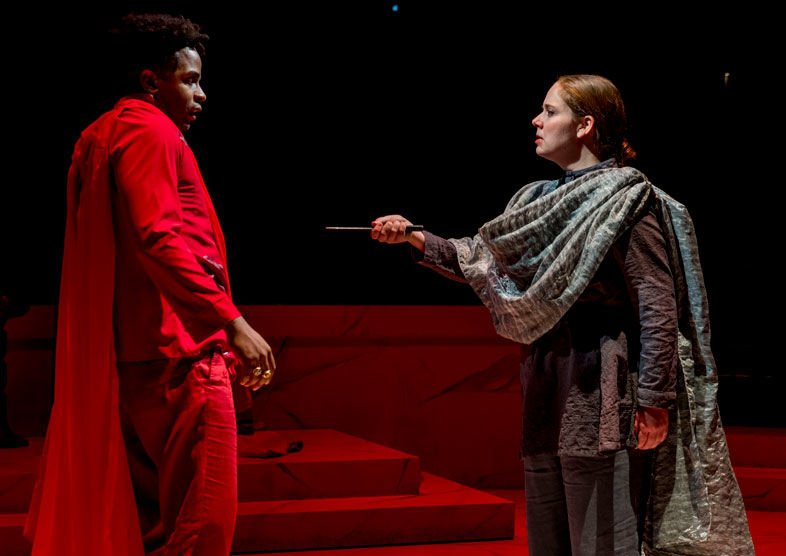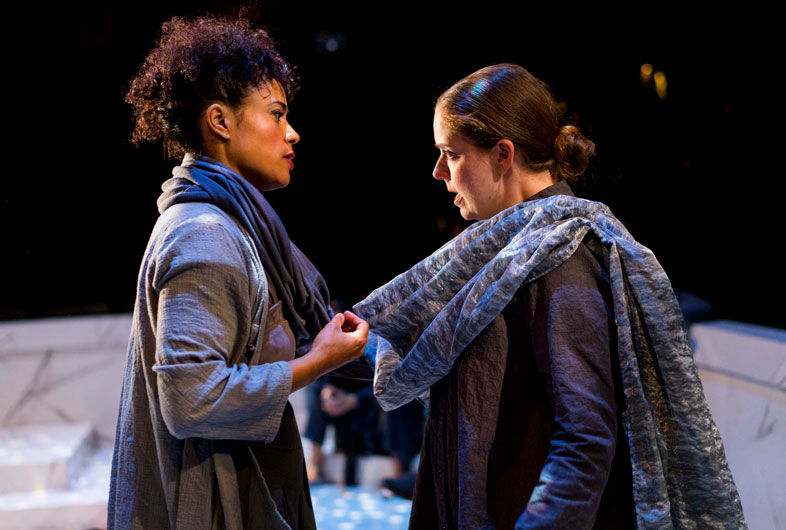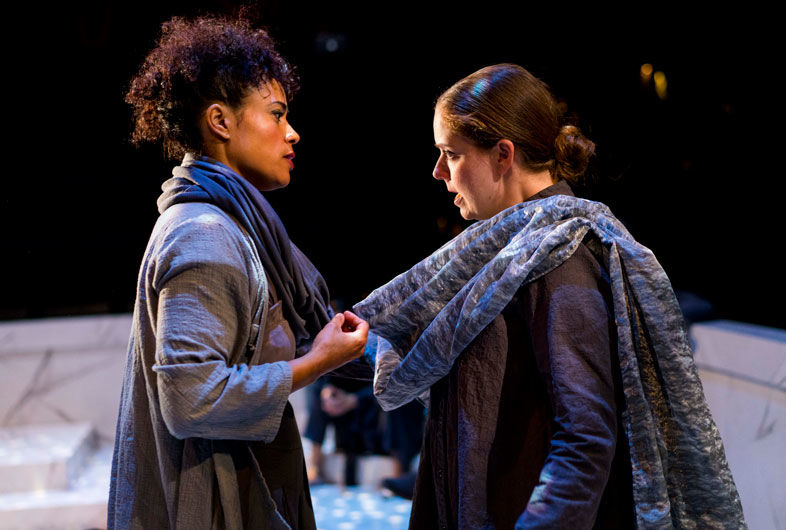When you’re first studying Shakespeare in high school, you imagine everyone standing around in dainty aristocratic ruffs, reciting in priestly tones more than speaking. It takes seeing Shakespeare live and done well to realize that it was not only intended to be understood by the common people—the plots usually boil down to a handful of huge gestures: weddings, murders, betrayals, etc.—but frequently depicts the commoners as well, in all their drunken, filthy wretchedness.
Until seeing The Old Globe and University of San Diego’s production of Julius Caesar, I never realized what a cynical perspective the play has of the Roman populi. They pivot from demanding vengeance for their would-be king’s assassination (spoilers?), to demanding the chief conspirator be crowned king instead, and right back to vengeance again, depending only on the last speech they heard. When the only fault Mark Antony can pretend to find in the late dictator is “ambition,” and the play spends two acts in his civil war against the conspirators but makes only passing mention of the previous civil war that brought Caesar himself to power, it becomes pretty impossible to find any pro-democratic sentiment at work. (Although what can you expect when your chief patron is Queen Elizabeth?)

Empire Is Inevitable in The Old Globe’s ‘Julius Caesar’
Jersten Seraile as Julius Caesar and Hallie Peterson as Marcus Brutus in Julius Caesar | photo by Daren Scott
Does that make Brutus and Cassius the villains, though? Yadira Correa certainly carries a villainous air as Cassius, stalking, seething, and smoldering under a fantastic combo of winged eyeliner and hair like a plumed Corinthian helmet. Her cries of “Liberty!” beneath a bloody dagger are bone-chilling—to the point where only the most dedicated anarchist could not feel a visceral terror of Oh shit; now what?
On the other hand, the deep conflict in Brutus is clear as soon as Hallie Peterson takes the stage. She nails the slowly faltering countenance of a leader coming to the awful, private realization that there’s no way to save both the republic and the leader that she holds dear. I’m sure actual scholars have made better arguments to the contrary, but it seems clear to me that she’s the tragic hero of the story, since she lives just long enough to see the irony that Caesar’s assassination only made a martyr of him, that it was already too late to stop the republic’s willing dissolution into empire.
Yadira Correa’s cries of ‘Liberty!’ beneath a bloody dagger are bone-chilling—to the point where only the most dedicated anarchist could not feel a visceral terror of Oh shit; now what?
Don’t expect any recognizable contemporary political figures. I’m glad to report that, with the exception of some unexpected post-intermission costume choices, this is a period-appropriate production. Jared Van Heel’s Mark Antony does look especially ruthless in a shining mercury suit, though. His delivery might benefit from greater dynamism (he’s not alone—in several scenes, everyone goes straight to shouting and leaves themselves little room between zero and eleven), but he’s skilled at turning from performative harmlessness before the conspirators to cold calculation while beseeching for lent ears. Likewise, Jersten Seraile demonstrates easy, untouchable confidence as Caesar, and out of all the supporting actors, Carlos Angel-Barajas most impressed me with how completely his composure changed to inhabit elderly Cicero, hapless bystander Cinna, and silver-spoon-smug Octavius.
The 14 actors in this production are the entire cohort of USD’s Shiley Graduate Theatre Program, an intensive course that recruits only seven students a year and partners closely with the Globe—you may recognize most of them from supporting roles in this summer’s The Tempest as well. The group has a thrilling energy that only grows the more of them are onstage together; the festival and battle scenes that bookend the performance hook you and keep you rapt. There are some moments whose silent portenteousness feels drawn out longer than warranted, which hurts a bit in a two-hour-plus show, but thankfully there are enough sharp performances and creative visual flourishes that I never stopped enjoying it, and can’t wait to see what this promising class does next.
Julius Caesar, directed by Allegra Libonati
by USD Shiley Graduate Theatre Program
at The Old Globe, through October 28
Tickets at theoldglobe.org

Empire Is Inevitable in The Old Globe’s ‘Julius Caesar’
PARTNER CONTENT
Yadira Correa as Caisus Cassius and Hallie Peterson as Marcus Brutus in ‘Julius Caesar’ | photo by Daren Scott


















